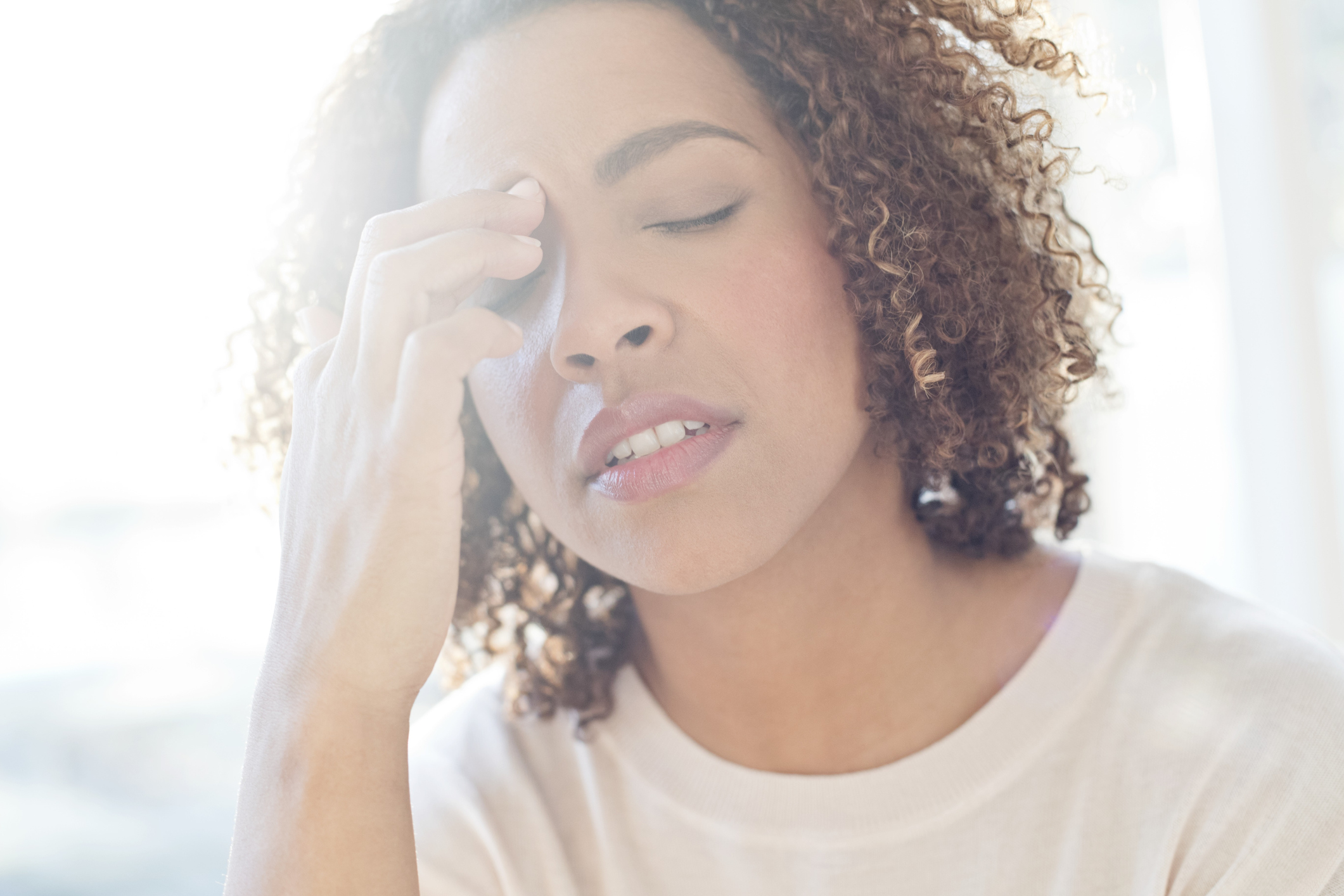Bacterial vaginosis symptoms go unnoticed in most women: 3 obvious flags you have it
We speak to three qualified experts to arm you with the need-to-knows.

We speak to three qualified experts to arm you with the need-to-knows.
You're likely clued up on the many thrush symptoms, signs of a urinary tract infection and even the different vaginal infection types, but have you ever heard of BV and do you know what the most common bacterial vaginosis symptoms are?
According to doctor Suhail Hussain, GP at Chelsea Pharmacy Medical Clinic, bacterial vaginosis - also known as BV - is a vaginal infection that often happens when a woman experiences change to her vaginal pH (that's the acidity, FYI).
Vaginal discharge is a symptom, and stats show up to 66% of women will have BV at some point in their lives - that's one in three women, or as clinical nurse and sexual health specialist Helen Knox explains, a whopping 8.9 million women in the UK.
Wondering what the bacterial vaginosis symptoms, causes or treatments are? Keep scrolling.
Bacterial vaginosis symptoms: 3 most common
Did you know? As many women as 50% of women won't experience any bacterial vaginosis symptoms whatsoever and therefore go undiagnosed. "Unlike thrush, it's not normally sore or itchy," explains doctor Connie Fearnley, junior doctor and GP trainee.
The main red flags include:
Marie Claire Newsletter
Celebrity news, beauty, fashion advice, and fascinating features, delivered straight to your inbox!
- A change in your normal vaginal discharge from clear to green or greyish
- An offensive (often fishy smelling) odour
- Symptoms worsening after sex.
Knox stresses that if you understand the correct symptoms to watch out for, it’s much easier to determine whether you are suffering from BV. "Ultimately, the vagina is self-cleaning, but it is also a delicate environment which can so easily be disrupted," she shares.

Bacterial vaginosis causes: how do you get BV?
Wondering how you get BV? In short, it normally occurs when your vaginal pH is a little out of whack.
According to the doctors, other causes include excessive washing, using perfumed soap or bubble bath, antibiotics, menstruation, using an IUD or coil and even semen (read up on the different contraception types, here).
Although it is not a sexually transmitted infection (here's how to know if you have an STD, by the way), it can be transmitted sexually, Fearnley explains. "While the cause of BV is not completely understood, symptoms typically present in sexually active women," she explains.
Bacterial vaginosis treatment: how do you treat BV?
Good question. Hussain advises a topical lactic acid gel, pessary or oral antibiotics - most commonly an oral contraceptive called metronidazole - but encourages you to visit your doctor if you are at all worried you may have the infection. These all treat the infection by helping to restore the normal pH balance of your vagina.
Not so sure about booking a GP appointment or feeling anxious about the prospect? "Many sexual health clinics offer a walk-in service where you do not require an appointment," explains Fearnley.
Do note here: it's important to treat BV because it can recur if not treated correctly, and puts you at a higher risk of sexually transmitted infection if you have it for a prolonged period of time.

4 tips for avoiding bacterial vaginosis:
In short, your vagina is all about balance. You need lactobacillus - aka good bacteria- down there to stop any other micro-organisms growing and disrupting your pH - aka your acid and alkaline balance.
Do try and make sure you're doing the right things day-to-day to keep this balance happy, the experts stress. How? Try the following.
1. Always practice safe sex
Obvious, but important - read our round ups of the best condoms, best sex toys and best lubes, while you're here.
2. Avoid scented products
One of the most important vaginal care tips of them all. "Avoid strong vaginal deodorants as these alter the vaginal pH," explains Fearnley.
Try this: just use water and plain soap to wash your vagina. Simple.
3. Take showers instead of long baths
The doctors share that baths increase your chances of contracting the infection, so are best avoided if you're worried you may have it. Take note.
4. Avoid strong detergents to wash your underwear
Another simple but easy-to-action one: be mindful of what you're washing your underwear with.
This is a good general down-there care point: after all, your vagina will be sitting against your underwear for at least twelve hours of each day, right?

Ally Head is Marie Claire UK's Senior Health and Sustainability Editor, nine-time marathoner, and Boston Qualifying runner. Day-to-day, she heads up all strategy for her pillars, working across commissioning, features, and e-commerce, reporting on the latest health updates, writing the must-read wellness content, and rounding up the genuinely sustainable and squat-proof gym leggings worth *adding to basket*. She also spearheads the brand's annual Women in Sport covers, interviewing and shooting the likes of Mary Earps, Millie Bright, Daryll Neita, and Lavaia Nielsen. She's won a BSME for her sustainability work, regularly hosts panels and presents for events like the Sustainability Awards, and is a stickler for a strong stat, too, seeing over nine million total impressions on the January 2023 Wellness Issue she oversaw. Follow Ally on Instagram for more or get in touch.
-
 This perfume was created in 1892, and I wear it today—it’s musky, sexy and deserves a spot in your collection
This perfume was created in 1892, and I wear it today—it’s musky, sexy and deserves a spot in your collectionIt smells nearly identical, 153 years later
By Nessa Humayun
-
 Pink activewear is officially the must-wear trend of the season - 9 items our Health Editors can't stop wearing
Pink activewear is officially the must-wear trend of the season - 9 items our Health Editors can't stop wearingMake your workout even more fun with a pop of pink.
By Amelia Yeomans
-
 Butter yellow is the colour of the season—and experts have confirmed it looks chic on nails too
Butter yellow is the colour of the season—and experts have confirmed it looks chic on nails tooHere's how to choose the best shade for you
By Mica Ricketts